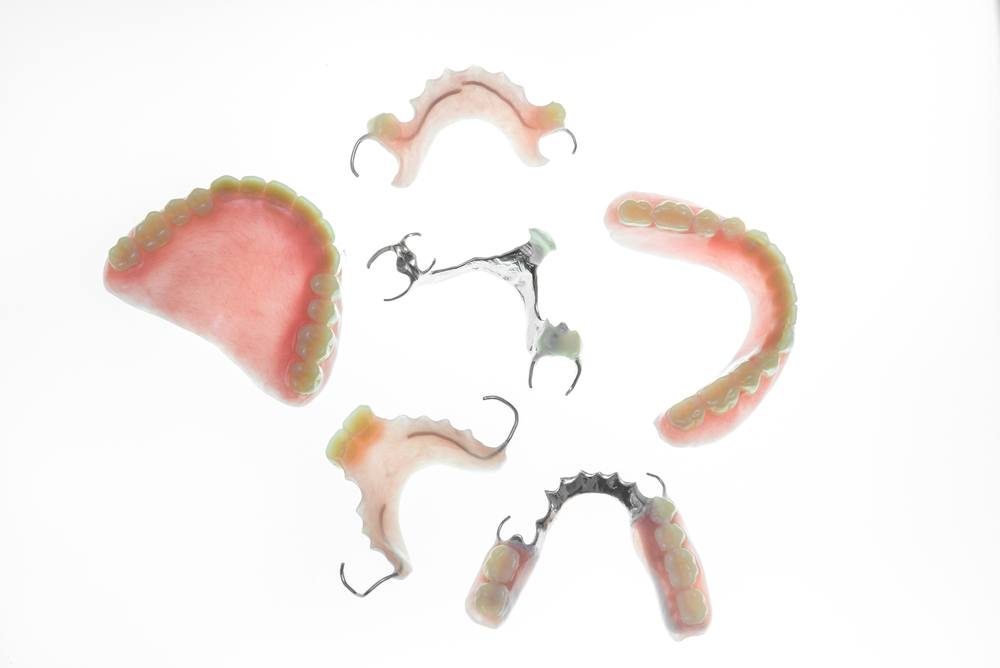Dentures
Traditional dentures are the cheapest and easiest way to replace multiple missing teeth, or all of the teeth. However, they have many downsides. If getting dentures is something you're thinking about, or expecting in the future, we urge you to go and talk to people who you know with dentures and get them to share their story with you. Nothing is as good as your real teeth, and we want you to be as educated as you can before you make that decision. There are two types of dentures: acrylic dentures (plastic) and chrome dentures (metal). It all depends on the teeth that you have left and your specific needs as to which one we recommend.
Advantages:
Cost: cheapest way to replace many missing teeth
Quick: generally doesn't involve much change in the mouth
More teeth can be added later. This makes dentures a good option for people who have some teeth that are not in good condition
Disadvantages:
Most dentures are completely dependent on the wearer's ability to adapt to them. Many people can never adapt to them. 50% of lower dentures do not get worn. Studies have shown that people who wear full dentures actually chew differently. The success of your dentures depends largely on your ability to adapt the muscles to keep them in.
Bulky - can interfere with speech and tongue function. This generally resolves once your muscles adapt to having them there.
- If it covers the palate, it will affect your taste
- Collects a lot of bacteria, causes increased decay rate on the teeth that it sits next to
-Multiple appointments to get the denture right
- The bone and gums change over time, so the denture needs to be adjusted, relined or remade accordingly. The bone continues to shrink away after the teeth are extracted, so the dentures will have less and less to hold them as the years go on. This is worse on the lower jaw. On the upper jaw, with age and with tooth loss, the sinus floor gets lower and lower which makes it harder and harder to put implants in in the future.
- Very dependent on your mouth: either enough strong teeth or good quality bone to hold the dentures in place. If you are missing your back teeth, the denture will have what we call a free-end saddle as it has nothing to hold it at the back. This means that the denture flips up when you are eating and can be very hard to make this comfortable
- Least retentive and least chewing function of all of the replacement options.


Alternatives:
Partial Dentures
Advantages
Alternatives
Disadvantages
Implant Retained Dentures
Advantages:
- Bone maintenance (holds your bone there so it doesnt shrink away) improved chewing function
- Reduced 'bulkyness' of your dentures - dont have to have such long sides/across your palate
- Increased success and survival time of your denture
- Less load on your natural teeth
- Improved confidence and less anxiety about dentures failing at a social event
Are your dentures loose or uncomfortable? This is a major problem for many denture wearers, particularly on the lower jaw. Bottom dentures are horrible to wear - in fact, 50% of patients cant tolerate them.
The solution? More retention. We achieve this by using special implants designed to support dentures (MDI implants). These are much cheaper than your fixed standard implants - only $2000 per denture implant (xrays, consultations and dentures are separate).
The implant has a connection which clips into a special attachment in your denture and provides much more stability. This is particularly useful when you do not have any back teeth to support your denture, what we call a "free end" denture.
Denture implants are suitable for patients with full dentures (no teeth on one arch), or partial dentures (some remaining natural teeth, however not enough to hold the denture securely.
Come in to have a look at some models and discuss whether or not this is a suitable solution for you.
